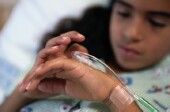Benefits seen for some children and young adults with relapsed or refractory cancer
TUESDAY, Sept. 1, 2015 (HealthDay News) — For some pediatric cancer patients with relapsed or refractory cancer, extensive genetic analysis can open up new options, according to research published in the Sept. 1 issue of the Journal of the American Medical Association.
The findings are based on 91 pediatric cancer patients at Mott Children’s Hospital who were out of standard treatment options. Rajen Mody, M.B.B.S., a pediatric oncologist at the University of Michigan C.S. Mott Children’s Hospital in Ann Arbor, and colleagues analyzed each child’s genetic blueprint, including DNA and RNA from their tumors and from healthy tissue.
Mody’s team found that 46 percent of the children had a genetic finding that could potentially be acted upon. Physicians were able to take that action for only some patients, though — including 14 children who started a new therapy, the team reported. Those children were placed on recently developed, targeted cancer drugs. Overall, nine of the children responded, with either a partial or complete remission.
On the surface, those numbers might not seem very encouraging, Mody said. “But these are the hardest of the hard cases. They’ve gone through all the tests and the treatments we have,” he told HealthDay. “These are the children for whom we haven’t seen any real improvement in outcomes in the past 40 years. This offers some hope that we’ll be able to treat these children in a more personalized way.”
One author disclosed serving on the scientific advisory board of Paradigm Diagnostics.
Abstract
Full Text (subscription or payment may be required)
Editorial (subscription or payment may be required)
Copyright © 2015 HealthDay. All rights reserved.








